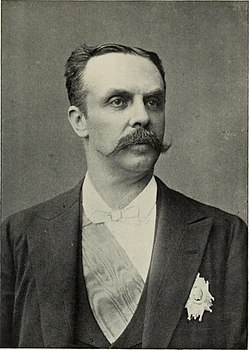Jean Casimir-Perier
| Jean Casimir-Perier | |
 | |
| Född | Jean Paul Pierre Casimir-Pérrier[1] 8 november 1847[2][3][4] Paris gamla första arrondissement[1], Frankrike |
|---|---|
| Död | 11 mars 1907[2][4][5] (59 år) Paris |
| Begravd | Chapelle Casimir-Périer de Pont-sur-Seine |
| Medborgare i | Frankrike |
| Utbildad vid | Lycée Condorcet Universitetet i Paris |
| Sysselsättning | Politiker, diplomat |
| Befattning | |
| Ledamot av Frankrikes nationalförsamling Konseljpresident (1893–1894) Fransk samfurste av Andorra (1894–1895) Frankrikes president (1894–1895) | |
| Politiskt parti | |
| Gauche républicaine | |
| Maka | Hélène Casimir-Perier |
| Barn | Claude Casimir-Perier (f. 1880) Germaine Sommier (f. 1881) |
| Föräldrar | Auguste Casimir-Périer Camille Fontenilliat |
| Utmärkelser | |
| Storkors med kedja av Karl III:s orden (1894)[6] Concours général Hederslegionens stormästare Storkors av Hederslegionen | |
| Redigera Wikidata | |
Jean Paul Pierre Casimir-Perier, född 8 november 1847 i Paris, död 11 mars 1907, var en fransk president. Han var son till Auguste Casimir-Périer.
Casimir-Perier deltog i fransk-tyska kriget, och gjorde därefter sitt inträde i det politiska livet som sekreterare åt sin far, då denne var inrikesminister under Adolphe Thiers. 1876 blev han deputerad för departementet Aube, där han sedan kom att fortsätta att återväljas under resten av sitt liv. I motsats till familjens konservativa tradition anslöt sig Casimir-Perier til vänsterrepublikanernas grupp men vägrade 1886 rösta för förvisningen av de tidigare regerande kungahusens medlemmar. 1890–92 var han deputeradekammarens vicepresident och valdes 1893 till dess president. Samma år blev han konseljpresident och innehade samtidigt utrikesministerposten. Han satte som mål att "omdana den franska revolutionens principer till ett verktyg för ordningens upprätthållande". Han undertryckte den anarkistiska våldspropagandan, och motsatte sig konstitutionens omdaning och förslag om skilsmässa mellan stat och kyrka. Efter mordet på Carnot blev han 24 juni 1894 vald till republikens president. Redan från starten angreps han hårt från vänstern, och redan efter 6 månader, några dagar efter att ministären Dupuy fallit, begärde han 14 januari 1895 sitt avsked. Han förklarade sig vid sitt avsked lärt sig inse, att republikens president är berövad varje aktivt inflytande och att hans ministrar inte ens rådgjort med honom, innan de fattat sina beslut, särskilt angående utrikespolitiken.
Casimir-Perier övergav därefter helt politiken, och ägnade sig åt affärsverksamhet. Under Dreyfusaffären angav han ett vittnesmål, som gick stick i stäv med general Merciers och blev av stor betydelse för Alfred Dreyfus frikännande.
Källor
- Svensk uppslagsbok. Lund 1930
Noter
- ^ [a b] archives de Paris, s. 47, läs online, läst: 25 mars 2024.[källa från Wikidata]
- ^ [a b] Frankrikes nationalförsamling (red.), Sycomore, Sycomore-ID: 1484, läs online, läst: 9 oktober 2017.[källa från Wikidata]
- ^ Léonoredatabasen, Frankrikes kulturministerium, Léonore-ID: C/0/7, läst: 9 oktober 2017.[källa från Wikidata]
- ^ [a b] Encyclopædia Britannica, Encyclopædia Britannica Online-ID: biography/Jean-Casimir-Periertopic/Britannica-Online, läst: 9 oktober 2017.[källa från Wikidata]
- ^ SNAC, SNAC Ark-ID: w63f76t4, läs online, läst: 9 oktober 2017.[källa från Wikidata]
- ^ läs online, hemerotecadigital.bne.es .[källa från Wikidata]
|
Media som används på denna webbplats
Icon of simple gray pencil. An icon for Russian Wikipedia RFAR page.
Författare/Upphovsman: Internet Archive Book Images, Licens: No restrictions
Identifier: evolutionoffranc00coub (find matches)
Title: The evolution of France under the third republic
Year: 1897 (1890s)
Authors: Coubertin, Pierre de, 1863-1937 Hapgood, Isabel Florence, 1850-1928. tr
Subjects:
Publisher: New York (etc.) T. Y. Crowell and company
Contributing Library: Robarts - University of Toronto
Digitizing Sponsor: University of Toronto
View Book Page: Book Viewer
About This Book: Catalog Entry
View All Images: All Images From Book
Click here to view book online to see this illustration in context in a browseable online version of this book.
Text Appearing Before Image:
is it was tochoose his battle-ground, to fortify his positions, toregulate the attack for the grand battle of the autumn.M. Constans was looked upon as an energetic and skil-ful man; he showed himself equal to his reputation.His first measures immediately conveyed an idea of theconception which he had of his part. He hesitated notto prosecute the League of Patriots,^ nor to discourage 1 The President of the Republic had had M. Tirard summoned afterthe failure of a combination of Meline, Ribot, and Casimir-Perier. Theministry comprised MM. Spuller (Foreign Affairs), Constans, Rouvier,de Freycinet, Fallieres, Thevenet, Yves Guyot, and Admiral Krantz, whodied shortly after, and was replaced by Admiral Jaures. - Atchinoff, a Cossack adventurer, disclaimed by Russia, had installedhimself at Sagallo. The neighborhood of Abyssinia rendered possibleintervention on the part of Italy. So Atchinoff was ordered to withdraw,and refused. Our cruisers, with a little too much precipitation, then bom-
Text Appearing After Image:
JEAN CASIMIR-PERIER, FIFTH PRESIDENT OF THE REPUBLIC. THE CRISIS. 235 the labor agitation organized by the syndicates andindependent collective groups of the Seine, nor to openthe doors of France to the Due dAumale, nor to sus-pend the secularization of the asylums which had alreadybeen ordered, nor, above all, to demand the passage ofa law to regulate the procedure of the Senate sitting asa Supreme Court of Justice. He caused some surpriseat first. Among those who were most disquieted at thespectacle of the progress of Boulangism, many werestill ignorant of the share of responsibility which Gen-eral Boulanger had therein, his corruption, his far-reaching calculations, his manoeuvres; they wondered,while the)^ felt conscious of his guilt, how the Senatewould succeed in proving a criminality of intentionsalone. The unexpected retirement of the attorney-general, who refused to prosecute the accused, trans-formed this doubt into excitement. With that profoundsense of justice which is inn
Note About Images

